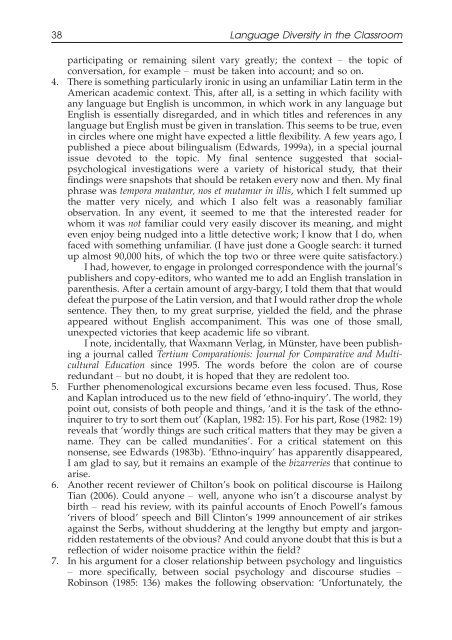Language Diversity in the Classroom - ymerleksi - home
Language Diversity in the Classroom - ymerleksi - home
Language Diversity in the Classroom - ymerleksi - home
- No tags were found...
You also want an ePaper? Increase the reach of your titles
YUMPU automatically turns print PDFs into web optimized ePapers that Google loves.
38 <strong>Language</strong> <strong>Diversity</strong> <strong>in</strong> <strong>the</strong> <strong>Classroom</strong>participat<strong>in</strong>g or rema<strong>in</strong><strong>in</strong>g silent vary greatly; <strong>the</strong> context <strong>the</strong> topic ofconversation, for example must be taken <strong>in</strong>to account; and so on.4. There is someth<strong>in</strong>g particularly ironic <strong>in</strong> us<strong>in</strong>g an unfamiliar Lat<strong>in</strong> term <strong>in</strong> <strong>the</strong>American academic context. This, after all, is a sett<strong>in</strong>g <strong>in</strong> which facility withany language but English is uncommon, <strong>in</strong> which work <strong>in</strong> any language butEnglish is essentially disregarded, and <strong>in</strong> which titles and references <strong>in</strong> anylanguage but English must be given <strong>in</strong> translation. This seems to be true, even<strong>in</strong> circles where one might have expected a little flexibility. A few years ago, Ipublished a piece about bil<strong>in</strong>gualism (Edwards, 1999a), <strong>in</strong> a special journalissue devoted to <strong>the</strong> topic. My f<strong>in</strong>al sentence suggested that socialpsychological<strong>in</strong>vestigations were a variety of historical study, that <strong>the</strong>irf<strong>in</strong>d<strong>in</strong>gs were snapshots that should be retaken every now and <strong>the</strong>n. My f<strong>in</strong>alphrase was tempora mutantur, nos et mutamur <strong>in</strong> illis, which I felt summed up<strong>the</strong> matter very nicely, and which I also felt was a reasonably familiarobservation. In any event, it seemed to me that <strong>the</strong> <strong>in</strong>terested reader forwhom it was not familiar could very easily discover its mean<strong>in</strong>g, and mighteven enjoy be<strong>in</strong>g nudged <strong>in</strong>to a little detective work; I know that I do, whenfaced with someth<strong>in</strong>g unfamiliar. (I have just done a Google search: it turnedup almost 90,000 hits, of which <strong>the</strong> top two or three were quite satisfactory.)I had, however, to engage <strong>in</strong> prolonged correspondence with <strong>the</strong> journal’spublishers and copy-editors, who wanted me to add an English translation <strong>in</strong>paren<strong>the</strong>sis. After a certa<strong>in</strong> amount of argy-bargy, I told <strong>the</strong>m that that woulddefeat <strong>the</strong> purpose of <strong>the</strong> Lat<strong>in</strong> version, and that I would ra<strong>the</strong>r drop <strong>the</strong> wholesentence. They <strong>the</strong>n, to my great surprise, yielded <strong>the</strong> field, and <strong>the</strong> phraseappeared without English accompaniment. This was one of those small,unexpected victories that keep academic life so vibrant.I note, <strong>in</strong>cidentally, that Waxmann Verlag, <strong>in</strong> Münster, have been publish<strong>in</strong>ga journal called Tertium Comparationis: Journal for Comparative and MulticulturalEducation s<strong>in</strong>ce 1995. The words before <strong>the</strong> colon are of courseredundant but no doubt, it is hoped that <strong>the</strong>y are redolent too.5. Fur<strong>the</strong>r phenomenological excursions became even less focused. Thus, Roseand Kaplan <strong>in</strong>troduced us to <strong>the</strong> new field of ‘ethno-<strong>in</strong>quiry’. The world, <strong>the</strong>ypo<strong>in</strong>t out, consists of both people and th<strong>in</strong>gs, ‘and it is <strong>the</strong> task of <strong>the</strong> ethno<strong>in</strong>quirerto try to sort <strong>the</strong>m out’ (Kaplan, 1982: 15). For his part, Rose (1982: 19)reveals that ‘wordly th<strong>in</strong>gs are such critical matters that <strong>the</strong>y may be given aname. They can be called mundanities’. For a critical statement on thisnonsense, see Edwards (1983b). ‘Ethno-<strong>in</strong>quiry’ has apparently disappeared,I am glad to say, but it rema<strong>in</strong>s an example of <strong>the</strong> bizarreries that cont<strong>in</strong>ue toarise.6. Ano<strong>the</strong>r recent reviewer of Chilton’s book on political discourse is HailongTian (2006). Could anyone well, anyone who isn’t a discourse analyst bybirth read his review, with its pa<strong>in</strong>ful accounts of Enoch Powell’s famous‘rivers of blood’ speech and Bill Cl<strong>in</strong>ton’s 1999 announcement of air strikesaga<strong>in</strong>st <strong>the</strong> Serbs, without shudder<strong>in</strong>g at <strong>the</strong> lengthy but empty and jargonriddenrestatements of <strong>the</strong> obvious? And could anyone doubt that this is but areflection of wider noisome practice with<strong>in</strong> <strong>the</strong> field?7. In his argument for a closer relationship between psychology and l<strong>in</strong>guistics more specifically, between social psychology and discourse studies Rob<strong>in</strong>son (1985: 136) makes <strong>the</strong> follow<strong>in</strong>g observation: ‘Unfortunately, <strong>the</strong>
















